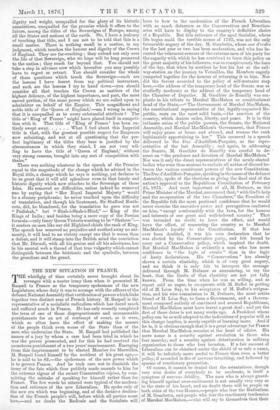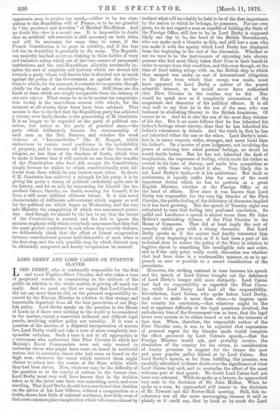THE NEW SITUATION 1N FRANCE. T HE whirligig of time certainly
never brought about its revenges with a neater irony than when it presented M. Raspail to France as the temporary spokesman of the new Legislature, whose duty it was to arrange with the officers of the defunct National Assembly that verification of powers which links together two distinct eras of French history. M. Raspail is the representative of a socialistic radicalism which has dared much and suffered much in France. He has only recently completed the term of one of those disproportionate and unreasonable punishments for an act of contempt of court, as it were, which so often have the effect of making the masses of the people think even worse of the State than of the men who undermine the State. M. Raspail had published the names of a jury by whom a case had been tried in which he was the person prosecuted, and for this he had received the monstrous punishment of a two years' imprisonment. Emerging from this imprisonment to be elected Member for Marseilles, M. Raspail found himself by the accident of his great age,— he is said to be 82,—the spokesman of the new power which is to govern France. And he took care not to diminish the irony of the fate which thus publicly made amends to him for the extreme rigour of the recent Conservative regime, by com- mitting the mistake of speaking for himself rather than for France. The few words he uttered were typical of the modera- tion and reticence of the new Liberalism. He spoke only of the new era which was beginning, and of the decisive declara- tion of the French people's will, before which all parties must bow,—and no doubt the Radicals and the Socialists will have to bow to the moderation of the French Liberalism with as much deference as the Conservatives and Reaction- aries will have to display to the country's definitive choice of a Republic. But this reticence of the aged Socialist, whose life began amid the terrible scenes of 1793, was not the only favourable augury of the day. M. Gambetta, whose mot d'ordre for the last year or two has been moderation, and who has in- curred the vehement censure of the extreme men of his party for the sagacity with which he has contrived to force this policy on the great majority of his followers, was so conspicuously the hero of the day, that when by accident he lost his hat at the rail- way-station on the journey to Versailles, the Members eagerly competed together for the honour of returning it to him. Nor did the favour accorded to the policy of self-restraint stop here,—the address of the temporary head of the Senate was as studiedly moderate as the address of the temporary head of the Chamber of Deputies. M. Gauthier de Rumilly was em- phatic in his tribute to Marshal MacMahon as constitutional head of the State,—" The Government of Marshal MacMahon, the constitutional representative of the legally-organised Re- public, rests on the most solid basis,—the sanction of the country, which desires order, liberty, and peace. It is in this intimate union of the public powers, the Senate, the National Assembly, and Marshal MacMahon's Government, that France will enjoy peace at home and abroad, and resume the rank legitimately appertaining to her." This occurred in a speech delivered to the Due d'Audiffret-Pasquier, as the repre- sentative of the last Assembly ; and again, in addressing the Senate, M. Gauthier de Rumilly was careful to de- • scant on " the prudence and devotion of Marshal MacMahon." Nor was it only the direct representatives of the newly elected bodies who were thus anxious to exclude all notion of discord be- tween the various constituent powers of the new Constitution. The Due d'Audiffret-Pasquier, speaking in the name of the defunct Assembly, spoke of the elections as giving the final seal of the nation's approval to the Republican Constitution of February 25, 1875. And most important of all, M. Dufaure, as the Prime Minister of the Marshal, announced that," with God's help and the co-operation of the two Chambers," the President of the Republic felt the most profound confidence that he would never exercise the executive power and prerogatives conferred on him, " except conformably with the laws, for the honour and interests of our great and well-beloved country." That was intended no doubt to have the effect, and would have the effect, of reassuring the country as to Marshal MacMahon's loyalty to the Constitution. If that has ever been doubted, it was his own declaration that he was elected by the Conservative party, and felt bound to carry out a Conservative policy, which inspired the doubt. But Marshal MacMahon is evidently a man who has more confidence in " the logic of events " than in the logic of hasty declarations. His " Conservatism " has already shown a certain elasticity, which is of very good augury, and we think it is only fair to interpret the message delivered through M. Dufaure as announcing, to say the least, that the limits of that elasticity are not yet fully known. From the time when he was so willing, and as report said so eager, to co-operate with M. Buffet in getting rid of M. Leon Say, to his acceptance of M. Buffet's resigna- tion, and his wise commission to M. Dufaure, the most active friend of M. Leon Say, to form a Government, and a Govern- ment composed entirely of convinced and avowed Republicans, Marshal MacMahon must have learnt a great deal ; and yet the first of these dates is not many weeks ago. A President whose policy can be so well adapted to the indications of popular will as this change implies, is surely capable of learning more. And if he is, it is obvious enough that it is a great advantage for France that Marshal MacMahon remains at the head of affairs. His mere name is a security against revolution to those who fear anarchy, and a security against deterioration in military organisation to those who fear invasion. If a fair amount of Liberalism can be obtained under the shield of so safe a name, it will be infinitely more useful to France than even a better policy, if accorded in fits of nervous trembling, and followed by spasms of reactionary precaution. Of course, it cannot be denied that the ostentatious, though very wise desire of everybody to be moderate, is itself a symptom of nervous debility. The man who is always guard- ing himself against over-excitement is not usually very easy as to the state of his heart, and no doubt there will be people on both sides of the two Houses,—people who fear the Radicalism of M. Gambetta, and people who fear the reactionary tendencies of Marshal MacMahon,—who will say to themselves that their opponents seem to profess too much,—either to be too obse- instinct what will inevitably be held to be of the first importance quious to the Republican will of France, or to be too grateful to " the prudence and devotion " of Marshal MacMahon. And no doubt this view is a sound one. It is impossible to doubt that an artificial self-restraint is still necessary on both sides, and will be necessary for some time to come, if the French Constitution is to grow in stability, and if the fear felt for its durability is gradually to die away. The Republi- can majority has had as yet no training in those habits of wary and tentative action which are of the very essence of permanent institutions, and the anti-Republican minority necessarily in- spires the sort of suspicion and jealousy which are always felt towards a party whose well-known bias is directed not so much against the policy of the Government as against the institu- tions in which, for the moment, it consents to co-operate, though chiefly for the sake of overthrowing them. Still these are the kinds of fears which are simply inseparable from the infancy of any new regime. What seems to us to be matter for congratula- tion to-day is the marvellous success with which, for the moment at all events, these fears have been subdued. That success is due to the fact that the Republican party has achieved a victory over itself, thanks to the generalship of M. Gambetta. It is no longer to be regarded as the party of political sen- sation, but rather as the party of practical aims,—the party which deliberately favours the statesmanship of such men as the Dac Decazes, and rebukes the weak violence of " Irreconcilables " like M. Naquet, which endeavours to restore rural confidence in the inviolability of property, and to reassure all Churches of the freedom of religion, no less than of the freedom of doubt, which tries to make it known that it will exclude no one from the benefits of the Constitution who bond fide accepts the Constitution, simply because he wishes to attain constitutionally ends dif- ferent from those which its own leaders most value. In short, if M. Gambetta has achieved a triumph for his party, it is by giving his party a stamp of political catholicity quite new in its history, and let us add, by renouncing for himself the im- mediate future, thereby, no doubt, securing for himself, if he lives, a still more brilliant ultimate future. It is this novel characteristic of deliberate self-restraint which augurs so well for the political era which began on Wednesday, and the very safe Ministry the composition of which was announced yester- day. And though we should be the last to say that the future of the Constitution is assured, and the last to ignore the anxious emphasis with which everybody announces that they feel the most perfect confidence in men whom they secretly distrust, we deliberately think that the effort at honest co-operation between constitutional powers half-distrustful of each other is the first step, and the only possible step, by which distrust may be ultimately conquered and hearty co-operation be secured.



































 Previous page
Previous page